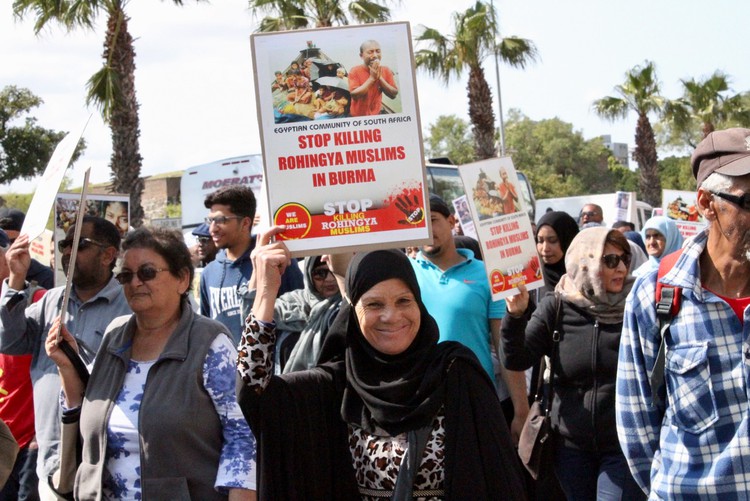March to Parliament over Rohingya killings
Protesters want the South African government to put pressure on Myanmar
Over a thousand people marched to Parliament to protest against the killings of Rohingya Muslims in Myanmar on Wednesday morning. Led by the Muslim Judicial Council along with other faith-based organisations, the protesters demanded that the Myanmar ambassador be summoned by the South African government.
The Rohingya, a majority of whom are Muslim, are an ethnic group in Myanmar where most people are Buddhist. The Rohingya are not officially recognised as one of the country’s 135 ethnic groups. They have been denied citizenship since 1982, effectively rendering them stateless.
Khadija Patel Allie, Chair of the Muslim Judicial Council Women’s Forum, said, “The Rohingya are denied their rights to education, land, freedom of movement, employment, and to [legally] marry. They are also subjected to forced labour and forced sterilisation. We demand that the Myanmar government immediately intervene and take responsibility for the widespread atrocities that have displaced thousands of Rohingya Muslims.”
Yusuf Trichardt, one of the protesters, said, “We need the South African government to step in and help our sisters and brothers by getting the message to the United Nations so that the killings can finally stop. The people of Rohingya are being killed senselessly. It’s completely inhumane. That’s why we’ve mobilised together as South Africans, not just as Muslims, to let the world know we are against these killings.”
Abdul Allie, Deputy President of the Muslim Judicial Council, said, “We are grateful for the response from the interfaith community because this is a humanitarian issue … It is the peoples’ power that can ultimately change society, like it did during apartheid.”
“The South African government needs to summons the Myanmar ambassador because we are asking ourselves, while this genocide continues, is it worth it for South Africa to have a diplomatic relationship with a country that is violating human rights?” asked Zaid Fataar, a protester.
Support independent journalism
Donate using Payfast

Don't miss out on the latest news
We respect your privacy, and promise we won't spam you.
© 2017 GroundUp. 
This article is licensed under a Creative Commons Attribution-NoDerivatives 4.0 International License.
You may republish this article, so long as you credit the authors and GroundUp, and do not change the text. Please include a link back to the original article.

